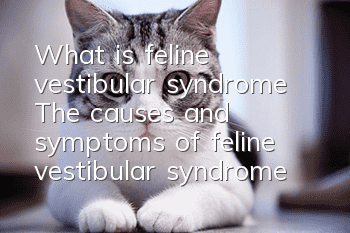What is feline vestibular syndrome? The causes and symptoms of feline vestibular syndrome!

Cats
What is feline vestibular syndrome? What are the causes and symptoms of feline vestibular syndrome! Vestibular syndrome is a common neurological syndrome in small animals, with various causes. From the perspective of pathogenic source, it can be divided into central and peripheral. At the same time, it also includes congenital and acquired diseases. It is a disease of cat body balance disorder caused by central damage to the vestibular nerve nucleus located in the medulla oblongata and partial damage to the vestibular nerve of the eighth cranial nerve.
1. Vestibular diseases include primary or secondary
Primary ones include:
1. Cat’s Vestibular syndromes: Acute, idiopathic, non-progressive vestibular disorders. Idiopathic disease, presumed to be caused by Cuterebra fly larvae.
2. Congenital vestibular syndrome
There are no characteristic changes in laboratory tests such as loss of hearing, decreased vision, persistent head tilt or tremor, and horizontal eye tremor.
Secondary include:
① Secondary to tumors
② Central or cerebellar vestibular disease
3. Peripheral The causes of sexual vestibular syndrome include:
① Idiopathic vestibular syndrome; ② Inner ear infection; ③ Nasopharyngeal polyps; ④ Hypothyroidism; ⑤ Tumors, including squamous cell carcinoma and adenocarcinoma and lymphoma; ⑥ drug-induced ototoxicity.
2. Metabolic diseases
Portal vein short circuit: the condition worsens after meals. Visual impairment, blind movement, depression, lethargy. Occasionally, hind limb spasms, blind movements, intermittent panting, poor appetite, drooling, and sudden loss of vision are seen. The BUN biochemical test value of PSS patients is lower than the reference value, the test values of ALT and ALP are in the normal range or on the high side, and the blood nitrogen concentration is significantly increased. There are uric acid crystals in the urine. X-ray examination shows that the liver is small.
3. Endocrine diseases
Hyperthyroidism: polyphagia, polydipsia, polyuria, excitement, muscle tremors, whining, weakness, hypertensive retinal detachment blindness.
1. The possibility of being caused by Cuterebra fly larvae is extremely small, and feline vestibular syndrome can be ruled out
2. The retina is intact, there is no excitement, and there are no symptoms of hyperthyroidism such as excessive eating and urination. Symptoms can be ruled out.
3. The blood ammonia test value is within the normal range, there is no salivation, and the symptoms are not related to eating. Portal vein short circuit can be ruled out.
4. The symptoms of central cerebellar syndrome are not obvious and can be ruled out. Secondary vestibular disease
5. Blood tests are within the normal range and can rule out infectious diseases such as Listeria.
4. Idiopathic vestibular disorders
One of the main types of vestibular syndrome, simple vestibular symptoms, acute balance disorder, significant head tilt, judgedisorder, dyskinesia, and no other symptoms. There is no age limit for the onset of the disease in cats. Symptoms often appear in late summer and early autumn. The initial symptoms appear suddenly and then become significantly weaker. It is easy to be misdiagnosed as convulsions and strokes. This symptom should be distinguished from simple otitis media.
5. Treatment measures
For diseases associated with infection, antibiotics and corticosteroids should be used while treating the primary disease. For traumatic injuries, a small amount of sedatives can be given to suppress inflammation for a short period of time, and a small amount of corticosteroids can also be used.
In cases of otitis interna, corticosteroids may cause purulent ulcers and are prohibited from use. Caused by Toxoplasma gondii, sulfonamide preparations can be used.
The recovery of this disease varies depending on the cause and severity of the disease. There are more congenital or pre-cancerous diseases with good prognosis. Infectious, neoplastic, B vitamin deficient and traumatic cases vary from case to case.
- Cat vomits cat food but is in good spirits
- How to stop cats from spraying? Cat corrective training!
- Sphynx cat personality traits
- Cat only eats meat, how to correct it
- How to feed short-haired Persian cats
- Can cats drink Huoxiang Zhengqi water?
- Cats are adorable, do you know how to feed kittens scientifically?
- How to raise Burmese cats Burmese cat raising tips
- How to raise British Shorthair cats British Shorthair feeding tips
- Cat bleeds after giving birth



